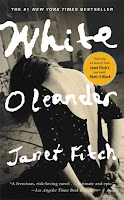Book Review: White Oleander by Janet Fitch
My Rating:⭐⭐⭐⭐⭐
“How many children had this happened to? How many children were like me, floating like plankton in the wide ocean? I thought how tenuous the links were between mother and children, between friends, family, things you think are eternal. Everything could be lost, more easily than anyone could imagine.”
Twelve-year-old Astrid Magnussen spends six years of her life in and out of foster homes (six foster homes and a state-funded home for those “returned”) after her selfish, manipulative mother, Ingrid, a free-spirited poet, is sent to jail for killing her lover.
Astrid’s feelings for her mother are conflicted. While her memories often take her back to happier times spent with her mother, Astrid cannot help but blame her mother for her present state and all the pain she has had to endure. In intermittent letters and the few visits with her mother in prison, Astrid recognizes her mother’s inability and unwillingness to comprehend the impact her actions have had on Astrid, to the extent that her cellmate wrote to Astrid telling her to only share happier moments in her letters as reading about Astrid’s difficulties makes her mother sad. Ingrid initially does not come across as repentant while sharing her accomplishments as a poet with her daughter, her poems being published and circulated while in jail, “a jail-house Plath“, also gaining a strong and sympathetic following in the outside world. Her response to her daughter’s hardships is for the most part devoid of compassion or concern and her biting wisdom borders on cruel , especially considering that she is writing her own child who has had her life and dreams taken away from her for no fault of her own.
“Loneliness is the human condition. Cultivate it. The way it tunnels into you allows your soul room to grow. Never expect to outgrow loneliness. Never hope to find people who will understand you, someone to fill that space. An intelligent, sensitive person is the exception, the very great exception. If you expect to find people who will understand you, you will grow murderous with disappointment. The best you'll ever do is to understand yourself, know what it is that you want, and not let the cattle stand in your way.”
“You are too nostalgic, you want memory to secure you, console you. The past is a bore. What matters is only oneself and what one creates from what one has learned. Imagination uses what it needs and discards the rest—where you want to erect a museum. Don’t hoard the past, Astrid. Don’t cherish anything. Burn it. The artist is the phoenix who burns to emerge.”
Over the next six years, Astrid’s life is a kaleidoscope of loneliness, rejection, negligence, jealousy, violence and inappropriate sexual relationships tempered with a few moments of kindness and kinship– moments, relationships, and hopes that never seem to stick, only adding to her misery and her sense of abandonment and loss.
“How easy I was. Like a limpet I attached to anything, anyone who showed me the least attention. I promised myself that when she returned, I would stay away, I would learn to be alone, it was better than the disappointment when you found it out anyway. Loneliness was the human condition, I had to get used to it.”
As the narrative progresses, Astrid grows and learns from her experiences. In the process of understanding and interpreting the world around her she channels her energy and emotions into her own creative pursuits. Though she learns to harden her heart, she does not completely lose herself, as we see in how she interacts with fellow foster students and how in her own way, though not quite in the manner she had hoped, she tries to find her place in the world. In her journey of self-discovery she also comes to terms with how she truly feels about her mother.
“I hated my mother but I craved her.”
Janet Fitch’s White Oleander paints a heart-wrenching picture of a dysfunctional mother-daughter relationship. The white oleander flower, while of particular significance as a plot point in the beginning of the novel, is also symbolically woven into the narrative as it manifests-both in its beauty and its toxicity- in the human relationships so vividly described in this story. Written in 1999, this is the kind of novel that stands the test of time. Dark and depressing (some content might be disturbing for readers) but so beautifully written that it holds you in its thrall- the kind of story that stays with you. This is so much more than a coming-of-age story. With its brilliantly poetic and powerful writing, fluid narrative and memorable characters Janet Fitch’s "White Oleander" is a modern masterpiece. I hadn’t watched the movie because I wanted to read the book first. I might pass on the movie but will definitely revisit this book in the future.
“Nobody took me away, Mother. My hand never slipped from your grasp. That wasn’t how it went down. I was more like a car you’d parked while drunk, then couldn’t remember where you’d left it. You looked away for seventeen years and when you looked back, I was a woman you didn’t recognize. So now I was supposed to feel pity for you and those other women who’d lost their own children during a holdup, a murder, a fiesta of greed? Save your poet’s sympathy and find some better believer. Just because a poet said something didn’t mean it was true, only that it sounded good. Someday I’d read it all in a poem for the New Yorker.”

Comments
Post a Comment